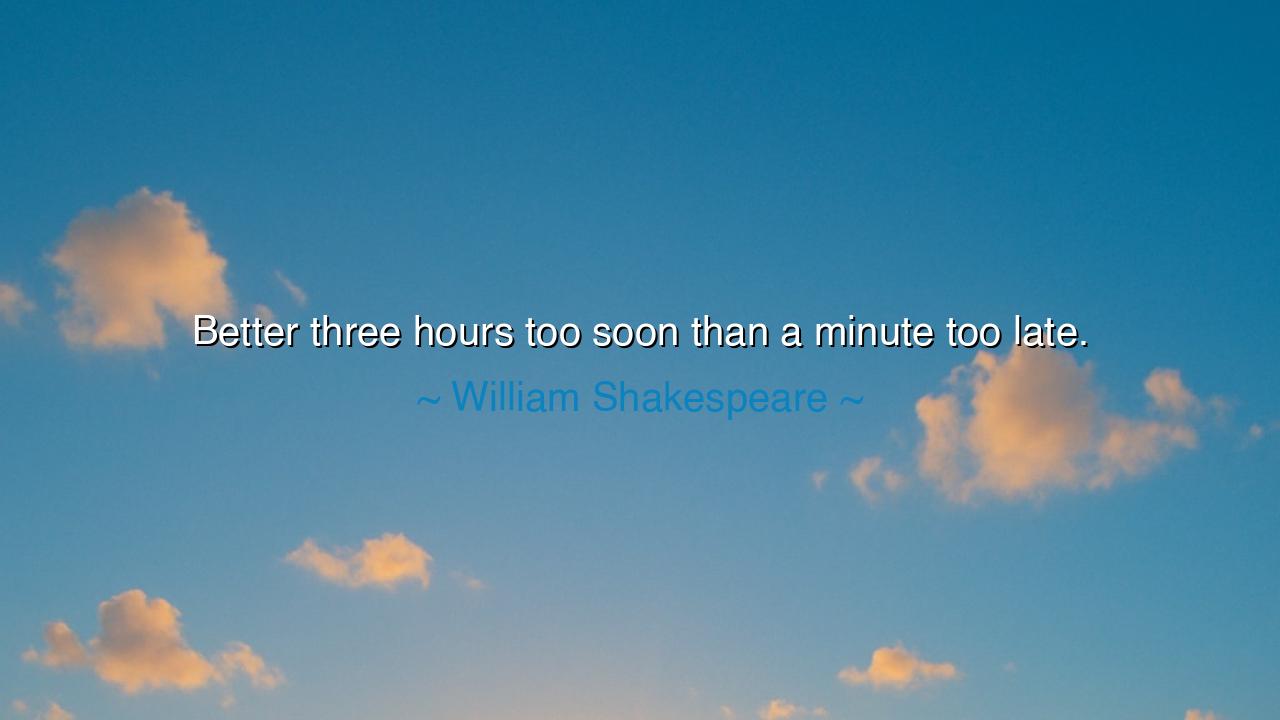
Better three hours too soon than a minute too late.






The great bard William Shakespeare once wrote, “Better three hours too soon than a minute too late.” These words, though simple in sound, carry the weight of discipline, foresight, and reverence for time. In them, Shakespeare captures a truth that has guided kings, soldiers, and sages alike: that to arrive early is a mark of wisdom, but to arrive late may bring ruin. For while earliness may cost one only patience, lateness may cost opportunities, trust, or even life itself. Thus, this quote is not merely about punctuality—it is a lesson in the stewardship of destiny.
The origin of this line is found in Shakespeare’s play The Merry Wives of Windsor. Though spoken in a comedic context, its truth reaches beyond the stage and into the fabric of existence. Shakespeare understood the delicate dance of timing—that life often hangs not upon great battles or speeches, but upon the simple matter of being present when needed. To be early is to show respect to others and to fate itself, for it acknowledges that no man controls the flow of time, but every man can prepare himself before it passes.
History bears countless examples of this wisdom. Recall the story of Julius Caesar on the fateful Ides of March. Warned of danger, he delayed, ignoring the counsel of seers and friends. He did not arrive early to caution, but lingered until it was too late. His lateness to heed warning cost him his life and changed the fate of Rome. How different might history have been if Caesar had chosen to move three hours too soon instead of one minute too late?
On the other hand, the triumph of George Washington at the Battle of Trenton shows the power of arriving early. On a bitter winter night, when many would have delayed until dawn, Washington crossed the Delaware too soon, in the darkness, in the storm. His early movement surprised the enemy, securing a victory that breathed new life into the American cause. His earliness seemed rash to some, but it proved the difference between defeat and endurance. Here we see Shakespeare’s truth in action: fortune favors those who prepare and act before the hour strikes.
The deeper meaning is that lateness is more than tardiness—it is a form of betrayal. To be late to an appointment is to betray another’s trust. To be late to opportunity is to betray one’s destiny. To be late to repentance is to betray one’s own soul. But to be early is to walk in readiness, to declare that you are prepared for what life may bring, even if it delays its arrival. Better to wait with dignity than to stumble in at the end, unprepared and ashamed.
The lesson is clear: honor time as you would honor a king. Make readiness your habit, for it is the shield against regret. Let no one ever say of you that you were the one who came too late, that you missed the chance, that you were unready for the moment fate laid before you. Better to wait in silence, prepared and steady, than to rush in panting after the moment has passed.
Practically, this means shaping your life with foresight and discipline. Leave early for the journey. Begin your tasks before the deadline. Prepare your heart before the trial comes. Do not wait to speak love until death makes silence eternal. Do not delay forgiveness until bitterness has hardened. In all things, seek to arrive before the appointed hour, so that when the call of destiny comes, you may rise with calm and strength.
So remember, children of tomorrow: better three hours too soon than a minute too late. For lateness is a thief that steals trust, opportunity, and life itself. But earliness is a sign of reverence, a token of respect, and a shield against regret. Be ready before the hour, and time will find you faithful. And when history looks back upon your life, may it say not that you arrived too late, but that you stood ready when the moment was born.






AAdministratorAdministrator
Welcome, honored guests. Please leave a comment, we will respond soon